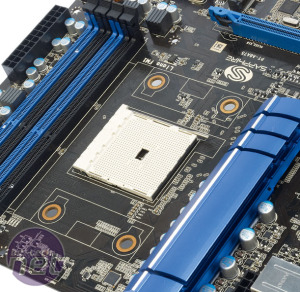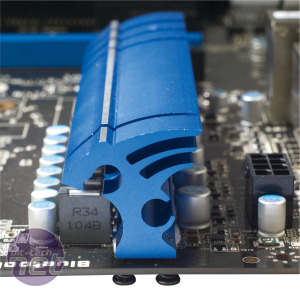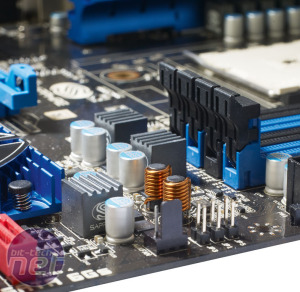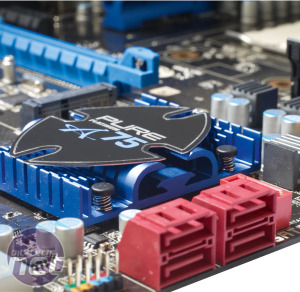Performance Analysis
When faced with our Media Benchmarks suite, the Pure Platinum fared well. Its score of 936 in the image editing test was the best we've seen from an FM1 board, if only by 11 points. A poor showing in the system intensive multi-tasking test, however, meant the board finished with an overall score of 1,071 - only three points ahead of the cheaper Gigabyte GA-A75M-UD2H. Thankfully, gaming performance on the Pure Platinum was strong, with the board returning a minimum frame rate of 40fps in Left 4 Dead 2.We've had mixed results overclocking FM1 APUs, so we were intrigued to see if the Pure Platinum's premium features would lead to better results. Testing started well, as the Pure Platinum can lower the CPU multiplier. This is useful, as it gives you the option of dropping the CPU multiplier if you hit the limit of the processor portion of the APU, but still have overclocking potential spare in the board's Reference Clock.
The effectiveness of this approach relies on having plenty of overclocking headroom in the motherboard, however, and while the Pure Platinum performed well in this regard, it wasn't the best we've seen. The GA-A75M-UD2H, for example, hit a maximum Reference Clock of 135MHz, whereas the most the Pure Platinum could manage while remaining stable was 125MHz. Of course, a Reference Clock of 125MHz will also have the advantage of your 1,600MHz memory running at 1,666MHz when using the 13.3x strap, but it could be a limitation if you have pricier high-frequency memory.
Annoyingly, the Pure Platinum's EFI shows the main APU and APU_NB voltages as offset, rather than absolute values, and doesn't show how your changes to the Reference Clock will affect memory speeds. After a little tinkering, however, our test APU ran at 3.5GHz with an APU voltage of +0.16V and an APU_NB of +0.15V. These settings pushed the Pure Platinum's scores marginally higher than those of the cheaper GA-A75M-UD2H in both 2D tasks and games.
Conclusion
The Sapphire Pure Platinum A75 is a solid motherboard that overclocks well and is quick at stock speeds. Unfortunately, it's also peppered with arguably pointless premium features that few people looking at an FM1 system will need or want. While they help differentiate the board from much of the FM1 competition, the Pure Platinum's price has been inflated as a result.
Although overclocking an APU is worthwhile for those chasing performance on a budget, the Gigabyte GA-A75M-UD2H overclocks just as well as the Pure Platinum and is also around £15 cheaper. Meanwhile, for those who are more attracted by FM1's simple one-chip setup, the cheaper but less overclockable MSI A75MA-G55 is the best bet. Either way, the Pure Platinum is too expensive a board to pair with a budget chip such as the AMD A8-3850.
-
Value10 / 25
-
Features22 / 30
-
Speed40 / 45


MSI MPG Velox 100R Chassis Review
October 14 2021 | 15:04













Want to comment? Please log in.